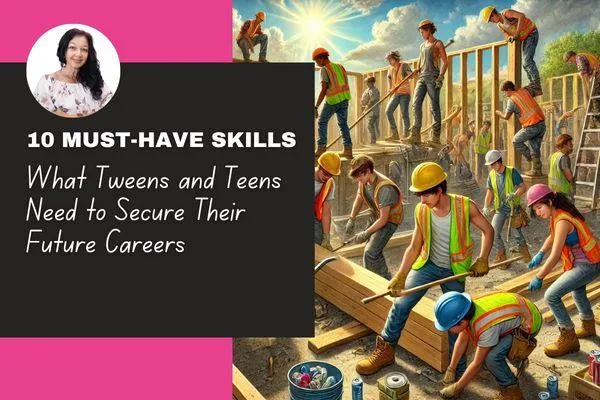
Marketing & AI Digest
Tips & Tricks to help you unleash the marketing in your business

10 Must-Have Skills Tweens and Teens Need to Secure Their Future Careers
"Just because the world they’re growing into doesn’t come with a manual doesn’t mean we can’t give them a map."
Just because the world they’re growing into doesn’t come with a manual doesn’t mean we can’t give them a map.(Because the world they’re growing into doesn’t come with a manual... but we can give them a map.)
Let’s not sugarcoat it.
Our kids aren’t growing up in the same world we did.
They’re growing up in a world where drones drop off groceries, ChatGPT writes cover letters, and someone just made $50K selling pixelated pictures of rocks or feet (yes people make money selling pictures of their feet)!
It’s wild. It’s weird. It’s their future.
Now, imagine standing at the edge of that future with your tween or teen beside you.
Would you feel confident handing them a shiny diploma and saying, “Good luck out there”?
Or would you want them equipped with something better than memorized facts?
Because the truth is this:
According to PayScale.com 65% of primary school kids today will work in jobs that haven’t even been invented yet.
And nearly half the careers we know today? Poof. About to be replaced or reshaped by AI and automation.
So the real question isn’t “Are they getting good grades?”
It’s “Are they learning the right skills?”
Let’s walk through 10 future-proof superpowers our kids need to set them up for their future:

1. Critical Thinking & Problem-Solving
Let’s be honest: the world isn’t handing out step-by-step instructions anymore.
From figuring out why the Wi-Fi isn’t working to decoding whether an online “fact” is actually true, our kids need to do more than follow directions.
They need to question, explore, and solve like curious little Sherlocks with extreme grit.
Picture your tween raving about a TikTok video that claims eating nothing but fruit for a week will "reset your brain" and make you smarter. They’re excited. It sounds legit. The creator had cool graphics and a lot of followers.
Instead of shutting it down, you say, “Interesting. Let’s check it out together.”
You look up the science behind brain function and nutrition. You compare it to what real dietitians say. You even check if any studies back it up (spoiler: they don’t).
By the end of the deep-dive, they’re not just rethinking the fruit diet. They’re rethinking how they consume content online.
That’s not just a parenting win. That’s a critical thinking upgrade in action.
Critical thinking isn’t about being right.
It’s about asking better questions.
And problem-solving? That’s just critical thinking in action - when they roll up their sleeves and fix what’s broken or make something work better.
You can introduce it at home in everyday life.
Let them solve real problems for example, “How can we get dinner on the table in 30 minutes with what’s in the fridge?”
Ask “why do you think that happened?” instead of rushing in with answers.
Play games that reward strategy (think: chess, coding puzzles, escape rooms).
Treat mistakes like puzzles to unpack, not something to avoid.
This skill is like a muscle - the more they use it, the stronger it gets.
And in a future full of complex challenges, critical thinkers aren’t just valuable. They’re unstoppable.
2. Creativity & Innovation
Remember when cardboard boxes became rocket ships and sofa cushions were castles?
That same spark, that ability to imagine something that isn’t there yet, is what fuels the entrepreneurs, product designers, and change-makers of the future.
And no, creativity isn’t just for artists. It’s for coders, doctors, marketers, inventors... anyone trying to solve a new problem with a fresh idea.
Years ago, I interviewed an 11-year-old on my podcast who blew my mind. He didn’t just talk about school or hobbies. He invented a shoe.
Not because a teacher told him to. Not for a grade. But because he saw a problem, and decided to solve it.
That’s what happens when we give kids space to think, explore, and create. Their imagination doesn’t just run wild, it runs useful.
(You can watch that interview here if you need a little inspiration)
What about…
Host family invention nights: “What could we make to help mornings go smoother?”
Celebrate weird ideas. Even the ones that flop. Especially the ones that flop
Give them space to fail forward. Innovation is built on trial and error.

3. Communication Skills
Being able to pitch an idea, write a clear message, or just listen. These aren’t soft skills. They’re survival skills.
Imagine this: Your teen writes a thoughtful email that lands them a mentorship with a startup founder. Or leads a group project and actually gets everyone to contribute. That’s gold.
Because it doesn’t matter how brilliant your idea is if you can’t explain it to anyone.
You can:
Ask your teen to “sell” you on something at dinner, why they deserve dessert, or why dogs are better than cats.
Let them run a family meeting or present ideas with visual aids.
Model strong communication: own your words, pause when needed, and listen like it matters, because it does.

4. Collaboration & Teamwork
Ah yes, the dreaded group project. We've all been there.
But here’s the thing, every workplace is one big group project. And no, you can’t just choose your teammates.
Our kids need to learn how to work with people they don’t like. People who think differently. People who challenge them.
Real-life moment: Think of astronauts. They live in a tin can with strangers for months and still have to fix complex systems together. Teamwork literally keeps them alive.
At home, you can support your children:
Give them shared responsibilities with siblings or cousins—like cooking dinner together or running a garage sale.
When conflicts arise, don’t swoop in. Help them mediate, listen, and problem-solve.
Let them fail as a team sometimes. Those are the best lessons.
5. Adaptability & Growth Mindset
If the last few years taught us anything, it’s that change is the only constant.
The kids who will thrive? The ones who don’t panic when the Wi-Fi cuts out during a presentation, or when they’re told their dream job has just been made obsolete.
They’ll learn to pivot.
What if a storm rolled through your backyard? The big, proud tree stands tall until the wind cracks it in half.
But over in the corner, the bamboo bends low, almost to the ground... then quietly springs back up. That’s not a weakness. That’s resilience.
And that’s what we want for our kids - not to never fall, but to always rise.
Let them make decisions even if they mess it up. The bounce-back is where the learning happens.
Celebrate the process, not just the outcome. “You really worked hard on that” beats “You’re so smart.”
Model bouncing back from your own setbacks out loud, in real time.

6. Emotional Intelligence (EQ)
We can’t outsource compassion.
We can’t automate integrity.
And no robot is going to notice when someone’s struggling quietly in a Zoom meeting.
That’s where EQ steps in as our human superpower.
Real-world example: A teen who can mediate a tense group project or comfort a classmate after a tough day is already showing leadership that can’t be taught from a textbook.
Build it at home:
Name emotions out loud: “I feel frustrated right now. I need space.”
Watch movies and pause to ask, “How do you think they’re feeling?”
Encourage empathy through volunteering or mentoring younger kids.
7. Digital Literacy & AI Awareness
Our kids don’t need to become AI engineers overnight.
But they do need to know how to use digital tools with awareness, not just autopilot.
Parental confession: The first time my 11-year-old asked if an influencer’s giveaway was real, I knew it was time for a deep dive on digital scams, AI filters, and data privacy.
Build it at home:
Show them how to use ChatGPT as a tool, not a crutch.
Teach them to question what they read online.
Talk about how their digital footprints shape future opportunities.

8. Financial Literacy
You know what’s harder than algebra? Explaining compound interest to a teen who thinks Afterpay is free money.
But here’s the truth: Understanding money = freedom.
Whether they become entrepreneurs or employees, they need to manage what they earn.
Build it at home:
Set up a simple budget project for something they want.
Let them earn and manage their own money, even in small ways like having a spreadsheet.
Use family expenses (like groceries) to teach cost comparison and savings.
9. Entrepreneurial Thinking
Not every teen will launch a startup. But every teen can learn to think like a founder.
That means spotting gaps, taking initiative, and bouncing back from failure.
Real-world magic: Teens who think entrepreneurially start clubs, fundraisers, and Etsy shops. They don’t wait for permission, they just start.
Build it at home:
Support them in running a small venture, even if it flops.
Celebrate effort, ideas, and lessons learned more than profits.
Ask, “What problem do you see around you, and what would fix it?”
10. Global & Cross-Cultural Awareness
The future doesn’t live on one street. It’s global.
And to thrive in it, our kids need to be curious about cultures, sensitive to differences, and open to new perspectives.
Think of a 14-year-old gamer in Australia teaming up with a teen in Brazil to code a game that teaches kids about ocean pollution, while a student in Kenya designs the soundtrack.
Or a high schooler in the Philippines who starts a TikTok series explaining mental health in multiple languages and connects with teens from ten different countries who’ve never had that conversation before.
Or two teens from completely different faiths collaborating online to build a website that helps refugee families find local resources - translating everything into English, Arabic, and French.
That’s not someday. That’s already happening.
Global is the new normal, and kids who understand the world beyond their neighborhood aren’t just more empathetic. They’re better collaborators, creators, and problem-solvers in any future career.
How you can help:
Watch international films or explore world cuisine as a family.
Encourage language learning - not just for school, but for connection.
Celebrate cultural traditions from your heritage and others’.
The Bottom Line
Degrees won’t cut it if our kids can’t adapt.
AI might outsmart them in fact, but it can’t out-feel them, out-create them, or out-think them critically.
These 10 skills?
They’re not “nice to haves.”
They’re the new basics.
So let’s teach them how to learn, unlearn, and relearn.
Let’s raise the kids who build robots and lead with empathy.
Who pitch bold ideas and know when to listen.
Because our kids weren’t born to follow the future.
They were born to lead it.
Want to raise future-ready kids who think, create, and lead in an AI world?
📘 Grab my book → Don’t Let AI Raise Your Kids
🎓 Take the course → Teach Your Kids AI
🎁 Get the freebie → AI Family Starter Toolkit
👉 Head to www.joynicholson.com to get everything in one place.
Because the future won’t wait - but your kids can be ready.

Contact us Today: +61 41 060 0653

Copyright © 2023 | Unleash Your Marketing | Service Agreement
* DISCLAIMER: This site is not a part of the Facebook™ website or Facebook™ Inc. Additionally, this site is not endorsed by Facebook™ in any way. Facebook™ is a trademark of Facebook™ Inc. There is no guarantee that growth will occur in 30 days. Results vary because of many factors, including the action taken by the person taking the challenge.
All testimonials are based on actual client results and are not promised. Your results fully depend on your action and dedication to implementing the tools provided to you during your Unleash Your Marketing experience | Prices are in USD | It is the customers responsibility to cancel within 7 days, or a full refund will not be given.
